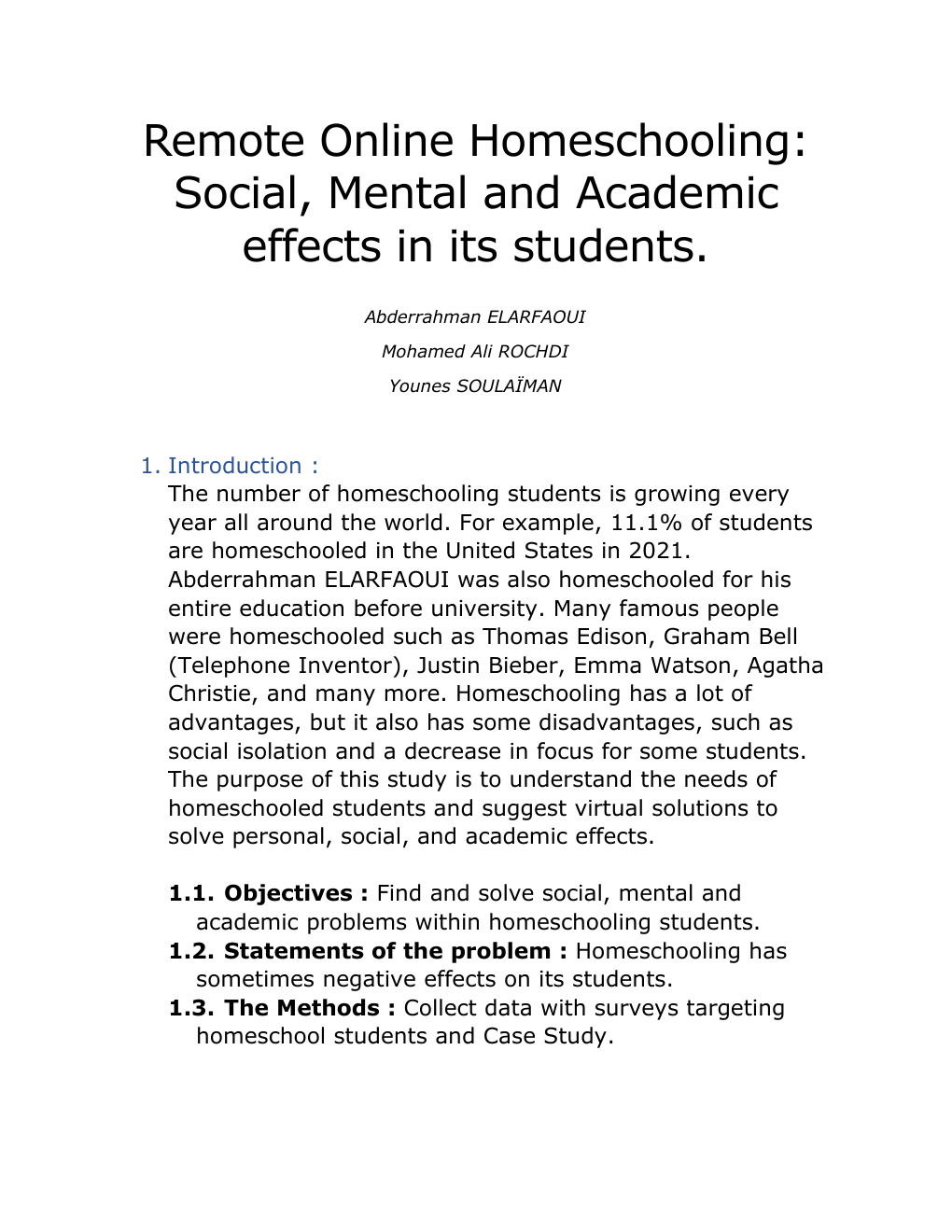Remote Online Homeschooling : Social effects on the students
Publié le 02/12/2022
Extrait du document
«
Remote Online Homeschooling:
Social, Mental and Academic
1.
Introduction :
The number of homeschooling students is growing every
year all around the world.
For example, 11.1% of students
are homeschooled in the United States in 2021.
Abderrahman ELARFAOUI was also homeschooled for his
entire education before university.
Many famous people
were homeschooled such as Thomas Edison, Graham Bell
(Telephone Inventor), Justin Bieber, Emma Watson, Agatha
Christie, and many more.
Homeschooling has a lot of
advantages, but it also has some disadvantages, such as
social isolation and a decrease in focus for some students.
The purpose of this study is to understand the needs of
homeschooled students and suggest virtual solutions to
solve personal, social, and academic effects.
1.1.
Objectives : Find and solve social, mental and
academic problems within homeschooling students.
1.2.
Statements of the problem : Homeschooling has
sometimes negative effects on its students.
1.3.
The Methods : Collect data with surveys targeting
homeschool students and Case Study.
2.
Information Gathering
The 5 articles :
1.
"The Social Effects Of Homeschooling"
Southernearlychildhood, Sharon (2022)
2.
"Is homeschooling socially harmful?" New internationalist,
(2021)
3.
"Social Skills for Homeschooling Students" Scientific
Research, Sameer Abuzandah
(2020)
4.
"Homeschooling effects on a child’s social skills" Birla
Brainiacs, 2022
5."Homeschooled children are far more socially engaged than
you might think" THE CONVERSATION, Kate Burton and Dr Eileen
Slater, 2019
2.1 Summary of the 1st article :
This article talks about the fact that Homeschooling has
grown in popularity as a choice for families in recent years.
Parents may decide to homeschool their kids for a variety of
reasons, but one of the most popular ones is the notion that
it would better equip them for the future.
It states that
homeschooling is generally benefical for student's social
devlopment, Homeschooled pupils are able to study more in
their prescribed curriculum since there are no time
restraints.
Students succeed academically at greater levels
as a result.
It also suggets that There are a number of
studies that suggest that homeschooled kids have better
social skills than their counterparts who attend traditional
schools.
2.2 Summary of the 2nd article :
Research has identified methods used by home educators to
foster socializing possibilities, including the formation of
learning cooperatives in which kids take classes with others
taught by the same parent or by a licensed instructor.
In my
study of black homeschoolers in Metro-Atlanta and MetroDC, I discovered that parents clearly understood the need of
socializing and, as a consequence, they made a range of
choices for their kids to engage in meaningful contacts with
others.
The children who were homeschooled also took part
in extracurricular activities, church functions, or
neighborhood clubs like 4-H Club1 and Scouting.
Parents
planned family-friendly activities for their kids, like chess
instruction with a local Grandmaster.
Last but not least, the
majority of the study's home educators resided in areas with
re-segregated public schools that mostly served pupils and
instructors of color.
As a result, homeschooling increased
kids' chances to interact with kids from varied racial,
linguistic, and cultural backgrounds.
2.3 Summary of the 3rd article:
This study aimed to shed light on how homeschooling
affected the social lives of homeschooled youngsters.
The
study uses learning theories from a variety of academics and
theorists, including Lev Vygotsky and Jean Piaget, to explain
the foundation of homeschooling in terms of a child's social
development.
The study's methodology involved many case
studies with 12 participants, half of them were currently
homeschooled pupils and the other four were parent
teachers.
Data from interviews that were semi-structured
were collected.
The study's conclusions demonstrated that
homeschooling generally helps kids develop strong morals
and values, which are crucial in interpersonal interactions.
However, it soon became clear that in order to promote a
child's cognitive growth, one must offer them the
opportunity to physically engage with peers, albeit in
supervised settings.
The study comes to the conclusion that
homeschooling can improve a child's social abilities, if the
parent teacher adopts the proper teaching method to
encourage positive social interactions with classmates.
2.4 Summary of the 4th article:
Socialization is the ongoing process of receiving and
spreading ideology, norms, and practices.
Numerous
characteristics of socialization....
»
↓↓↓ APERÇU DU DOCUMENT ↓↓↓
Liens utiles
- The impact of social media on our societies through the changes in lifestyles, diversity and human rights.
- The Buddha of suburbia
- the stolen generation
- Is there one side of the coin in the myth of the frontier?
- Droit social: La Convention collective

































